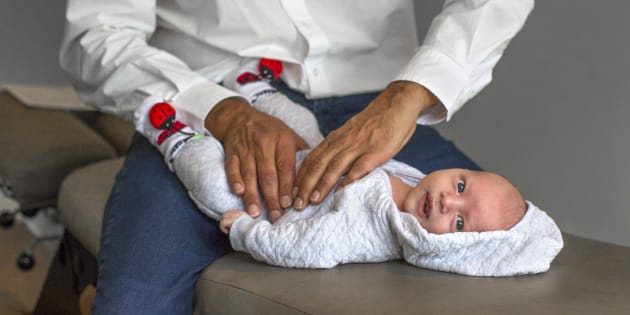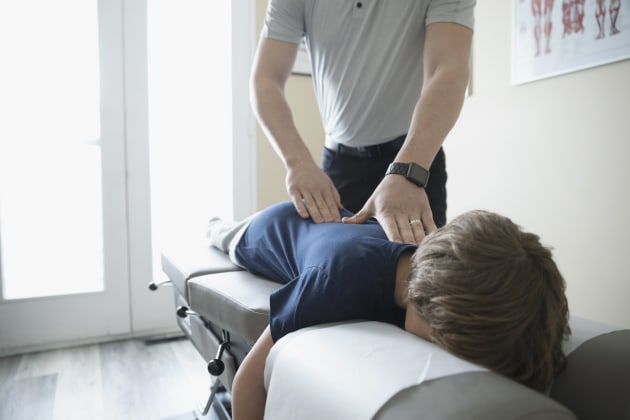
Thinking of taking your baby to have their spine adjusted by a chiropractor?
Don’t do it, warns the Australian Medical Association.
In a popular parenting page, Australian Medical Association (AMA) Northern Territories President Dr. Robert Parker urged parents to always see a doctor for any health concerns with their children, according to NT News. Babies and young children can’t communicate about their pain easily, and any potential complications could be quite serious, NT News reported Parker as saying (it appears his comments have seen since been deleted from the Facebook post).
“The AMA doesn’t support babies going to the chiropractor at all,” Parker said in response to a mom’s post seeking chiropractor recommendations for her 17-month-old, according to NT News.
“The AMA would be opposed to any unusual spinal manipulation in babies. We certainly would have some significant concerns about chiropractors and young children.”
The medical community has voiced its concerns before

It’s not the first time the AMA has warned parents to avoid the chiropractor. In 2013, AMA President Dr. Steve Hambleton outlined his concerns in an interview with ABC Radio 612, saying there wasn’t sufficient evidence to recommend chiropractic care for children.
“Unless there’s scientific evidence for any complementary therapies — we can’t recommend that they go there, and that includes chiropractory,” Hambleton said, according to a transcript posted to the AMA website.
And in 2016, the president of the Royal Australian College of General Practitioners lambasted the entire chiropractic industry after a controversial video emerged of an Australian chiropractor manipulating the spine of a newborn. Dr. Frank Jones told news.com.au that the treatment was “outlandish,” and that there’s “no scientific basis for most of the stuff they do.”
Canada’s chiropractors say there are health benefits

Pediatric care is within the regulated chiropractic scope of practice and is overseen by provincial ministries of health, the Canadian Chiropractic Association (CCA) said in a statement emailed to HuffPost Canada.
“Chiropractors treat children of all ages every day across Canada and many times they are referred from another health care provider,” the CCA said.
Treatment for children and infants is modified for their smaller frames, they noted, and it “frequently involves gentle touch and spinal massage, stretching, exercises, soft tissue therapy, and postural counselling.” Chiropractors require informed consent from a parent or legal guardian before initiating a clinical encounter with a child, they added.
“Children and youth may benefit from chiropractic care just like adults,” the CCA said.
“They can suffer from back pain and other spine, joint and muscle problems because of sitting posture at their computers, heavy backpacks, sports, and frequent tumbles and falls,” the CCA said.
Chiropractors will refer children to physicians if a diagnosis doesn’t indicate chiropractic care is required, or if other interventions are needed, the CCA wrote on its website.
Canada’s pediatricians urge open and honest discussions with parents

In a position statement that was reaffirmed in 2016, the Canadian Paediatric Society (CPS) urged its doctors to have open and honest conversations with parents using or considering chiropractic care in the hopes that they will choose to do so rationally “in selected musculoskeletal conditions for which there is proof of efficacy.”
Many families will not spontaneously disclose that they’ve decided to take their child to a chiropractor, CPS said, potentially because they expect a negative reaction. But it’s important for a physician to know about any alternative treatments being given to a child, especially given that some chiropractors may give advice related to immunizations, they explained.
“The physician should routinely ask families about complementary and alternative therapies or products that their child may be using. When the parents disclose that they have been taking the child to a chiropractor, one should inquire whether neck manipulations or forceful thrusts have been used, and if herbal or homeopathic preparations have been given,” CPS wrote in the position statement.
“All questions arising about the risks and benefits of immunization must always be discussed. If it is established that a chiropractor has negatively influenced a decision, it can then be pointed out that the CCA accepts and endorses vaccination.”
CPS concluded that well-designed studies are needed to evaluate whether chiropractic care is effective for children.